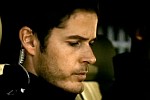 Shadows off the beaten path
Shadows off the beaten pathSUN KISSED | THE TIMES OF HARVEY MILK
< < V I D E O S > >
last update 25.Jan.09
See also: SHADOWS FILM FESTIVAL
 R E V I E W B Y R I C H C L I N E
R E V I E W B Y R I C H C L I N E
scr Ian Brady, Adrian Vitoria
with Scot Williams, Kenny Doughty, Stephen Graham, Philip Olivier, Rory McCann, Cordelia Bugeja, Rosie Fellner, Raza Jaffrey, Neil Bell, Tim Dantay, Paul Lee, Ryan Orr
 release UK 12.Jan.09 dvd
release UK 12.Jan.09 dvd08/UK 1h57
 There's plenty of visual style in this Liverpool crime drama, as well as solid performances from the whole cast. But the film's structure so impenetrable that it's impossible to engage with it.
There's plenty of visual style in this Liverpool crime drama, as well as solid performances from the whole cast. But the film's structure so impenetrable that it's impossible to engage with it.
Everything's going wrong for local crime boss Ged (Williams). His right-hand man has been killed, and no one knows who did it. His younger brother (Doughty) and pal (Olivier) are getting in far over their heads. His wife (Bugeja) is strangely close to the wife (Fellner) of a potential business partner (Jaffrey). And the top boss (Graham) is on the prowl. As things squeeze in on him, Ged needs the next big heist to go according to plan. Unlike last time.
Director-cowriter Vitoria kicks things off with a flurry of action and violence, plus loads of fast-paced mob chatter. He clearly wants to make the underworld feel gritty and cool as these characters indulge in sex, drugs and gunplay while never trusting each other. And rightly so. In the middle of this, the script tries to get us to sympathise with Ged, since things are so tough and confusing for him. Yet he's as ruthless and despicable as everyone else.
And this is where Vitoria loses us. We honestly couldn't care less what happens, and the film is assembled so that it's not easy to tell what's going on. It's a macho fantasy, complete with shiny cars, big guns, bags of cash, brutal violence and girl-on-girl action, plus a disturbing revenge obsession and a careless disregard for life. And even though the script and direction never get beneath the surface, the actors do their best, as does the gifted film editor Justinian Buckley.
However hard to like him, Williams at least brings a soulfulness to the central role that makes Ged interesting to watch. Doughty and Olivier are essentially the bumbling comical relief, although we know they are heading for serious nastiness. And Graham walks off with the whole movie as the only guy in the film who keeps a level head, calmly strolling from scene to scene to clean up every mess. Clearly the movie's production team needed someone like this on set.
24.Nov.08
 R E V I E W B Y R I C H C L I N E
R E V I E W B Y R I C H C L I N E
with Craig Gilmore, Mike Dytri, Darcy Marta, Scot Goetz, Mary Woronov, Johanna Went, Peter Grame, Mark Finch, Bretton Vail, Nicole Dillenberg, Christopher Mabli, Paul Bartel

release US 14.Aug.92,
UK 12.Feb.93/12.Jan.09 dvd
92/US 1h24
 After 16 years, Gregg Araki's break-out feature finally reaches DVD in the UK, and it's interesting how little it has dated. A chaotically vivid story of people coming to terms with Aids, the film is both moving and unsettling.
After 16 years, Gregg Araki's break-out feature finally reaches DVD in the UK, and it's interesting how little it has dated. A chaotically vivid story of people coming to terms with Aids, the film is both moving and unsettling.
Jon (Gilmore) is a nihilistic journalist in Los Angeles who has just found out he's HIV-positive. Luke (Dytri) is a hot-headed drifter who steals a gun from a pair of killers (Woronov and Went) and is immediately involved in a violent altercation with gay bashers. He's rescued by Jon, and the two of them begin a dark romance, hitting the road to help Luke escape the cops. As Luke's actions get increasingly violent, Jon's only link to real life is his friend Darcy (Marta), who's also having troubles with her boyfriend (Goetz).
The film reflects Araki's own angry young man tendencies, from a cheap swipe at film critics to the pretentious lead character names, a direct nod to Jean-Luc Godard. It's a bundle of cinematic iconography and lacerating comedy aimed at uptight society. But this bravado pays off through the low-fi, guerrilla filmmaking style. The freewheeling approach gives the whole film a slightly loopy tone that makes it utterly unpredictable. Indeed, we have to brace ourselves for awful things we know must be coming.
Meanwhile, Gimore and Dytri make a terrific odd couple; the smart, sensitive Jon contrasts hugely against the dumb, violent Luke. Their connection comes to life through twisted banter and jagged chemistry. Both of these men are tortured souls, and virtually the only thing they share is the virus that has taken away their future. As their interaction (calling it a relationship would be a stretch) continues, the film gets increasingly grim and brutal, paralleling their own images of themselves and the world around them.
Araki shows considerable skill at making an epic fable on very little money, even if the story gets lost along the way. And thematically, his harshest criticism is reserved for previous generations whose actions have left these young people to live and die without hope. When one of the men comments that "we're not like other guys", there's a ring of truth that lingers long after the film's sudden, moving conclusion.
15.Dec.08
 R E V I E W B Y R I C H C L I N E
R E V I E W B Y R I C H C L I N E
with John Ort, Gregory Marcel, Laura Leigh, George Stoll, Dyanne Asimow, Josh Kanuck, Michael M Hong
 release US 22.Nov.06,
release US 22.Nov.06, UK 26.Jan.09
06/US 1h32
 Artful and intriguing, but ultimately difficult to connect with, this atmospheric romantic drama has some solid characters and a superbly moody tone that really captures a sense of lust and longing.
Artful and intriguing, but ultimately difficult to connect with, this atmospheric romantic drama has some solid characters and a superbly moody tone that really captures a sense of lust and longing.
In the California desert, actor Leo (Marcel) drives writer Teddy (Ort) to the isolated home of their agent (Stoll), where Teddy is hoping to finally write his novel. After a night of bonding--drinking, dancing and bathing outdoors with a hose--Leo returns to his wife (Leigh) in the city. But the two men can't get each other out of their minds. The next few weeks are a swirl of confusion, as Teddy writes his novel (titled Goodbye) and Leo struggles with his sexuality.
Writer-director McGuinn is going for an impressionistic, almost Lynchian storytelling style in which the plot plays second fiddle to internal struggles. The film is structured out of sequence, mixing in memories, fantasies and what dramatised scenes from Teddy's book in such a way that it becomes impossible to know what's actually happening. McGuinn cleverly depicts the jarring disorientation of life at a crossroads. But as a film, it's not hugely accessible.
There's also the issue of budget; the film was shot in nine days on location in California and interiors in New York, and this fast, cheap approach shows in performances that aren't perhaps as honed as they could be. Some scenes should have been reshot, and montages need a bit more substance. The natural awkwardness adds to the characters' uncertainty, but the somewhat cheesy plotting feels abrupt and unexplained. And the flashback structure, accompanied by a sometimes corny electronic score, feels like a bit of a cheat as it dribbles information to us.
That said, the editing is inventive, examining tortured souls through evocative images of desert, mountain and sea. These are people with provocative internal issues, unable to let themselves fall in love even though the attraction is intense and the sex is steamy. But since we're never quite sure what's really going on, we can't really engage with what feels like a meandering, unfocussed story. And as a result, McGuinn's attempt to stir up some climactic suspense doesn't really grab hold. But it's still beautiful to look at, and bodes well for whatever he does next.
20.Jan.09
 R E V I E W B Y R I C H C L I N E
R E V I E W B Y R I C H C L I N E MUST
MUST SEE
SEE
scr Rob Epstein, Judith Coburn, Carter Wilson
narr Harvey Fierstein
with Harvey Milk, George Moscone, Dan White, Anne Kronenberg, Tory Hartmann, Tom Ammiano, Jim Elliot, Sally M Gearhart, Bill Kraus, Henry Der, Jeannine Yeomans, Dianne Feinstein
 release US 26.Oct.84,
release US 26.Oct.84, UK 26.Jan.09 dvd
84/US 1h23
MILK (2008)
and Epstein's
COMMON THREADS (1988)
THE CELLULOID CLOSET (1995)
 Timed with the opening of Gus Van Sant's MILK, this Oscar-winning documentary is finally released on DVD in the UK, and it's a terrific companion piece, recounting the story of Harvey Milk through the eyes of the people who knew him.
Timed with the opening of Gus Van Sant's MILK, this Oscar-winning documentary is finally released on DVD in the UK, and it's a terrific companion piece, recounting the story of Harvey Milk through the eyes of the people who knew him.
From the start, the film recognises Milk's unique contribution to the political scene, as he campaigned to crush stereotypes and promote real equality. Like Van Sant's drama, this film uses Milk's taped will as a framing devise to put his life into perspective, and from here filmmaker Epstein tells the story through reportage, recounting events clearly and letting the emotion come through in a natural, effective way. As a result, the film really captures Milk's passion.
Epstein also makes terrific use of news footage, most notably the revelatory TV interviews with Milk, Moscone and White. These sequences really convey the sense that Milk knew his life was part of a much bigger movement to end bigotry. Moscone's scenes strikingly capture his bold bridge-building style of governance. And we really sense White's growing anger at a movement that seems to undermine his own agenda. There are also superb anecdotes from the interviewees, a sharp montage about Milk's past and a sharp history of San Francisco's Castro district and its key role in the gay rights movement.
“You've got to elect gay people so that that young child, and the thousands upon thousands like that child, know that there's hope for a better world, that there's hope for a better tomorrow. Without hope, not only gays, but those blacks and the Asians, the disabled, the seniors - the us's - without hope the us's give up. I know that you cannot live on hope alone, yet without it life is not worth living. And you, and you, and you have got to give them hope.” — Harvey Milk
Of course, we also can't watch these events now without considering the 30 years that have passed. Milk's fight against the anti-gay Proposition 6 is clearly shown not as a battle of values, but a clash of fears. So Milk's campaign against ageism, racism and any kind of discrimination feels like a blast of fresh air. As San Franciscans take to the streets in solidarity over Milk's death or outrage over White's trial verdict, the resonant themes can't help but bring tears to our eyes.And as this intelligent, emotional and still-provocative film continues, the narrative becomes utterly gripping, like an emotionally charged thriller that's powerfully moving and deeply resonant. Especially since America seems to be losing the fight for true equality. Clearly, Milk is still ahead of his time 30 years after his death.
6.Jan.09


If you have an film you want me to review - just ASK
© 2009 by Rich Cline, Shadows
on the Wall